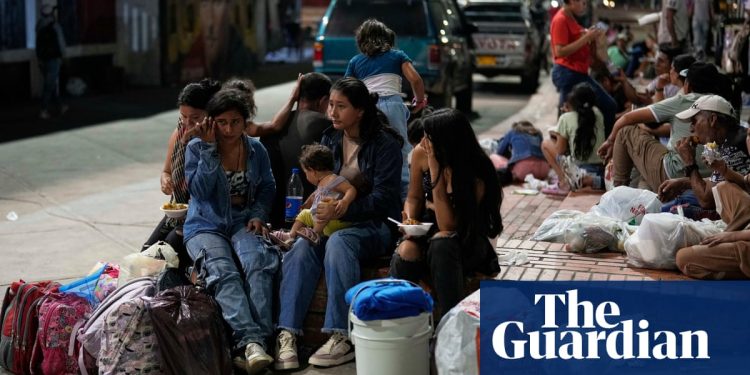Authorities in the Colombian border city of Cúcuta are struggling to cope with an influx of internal refugees, as thousands of civilians flee fighting between rival rebel factions.
Buses, trailers and dump trucks full of disoriented mothers and children have been flocking to the border town since Friday, when the bloody conflict began ravaging northeastern Colombia.
“We welcomed displaced families when violence had already broken out in the region, but we are far from this level. We’re talking about 15,000 people arriving in the city in just four days. It’s historic for Cúcuta, but unfortunately also for the country,” said the city’s mayor, Jorge Acevedo.
At least 80 people have been killed and 32,000 displaced as the ELN, the world’s oldest active guerrilla group, seeks to purge one of Colombia’s largest cocaine hubs of rival factions.
Rights groups say civilians are being targeted by the ELN and the 33rd Front, a band of dissident rebels who refused to disarm during the 2016 peace process. The fighters have gone door to door door looking for sympathizers of rival factions, said Iris Marín Ortiz, Colombia’s mediator.
Warring groups launch “indiscriminate attacks against fighters and civilians accused of collaborating with one or another group simply because they are family members or relatives,” Ortiz said.
Meanwhile, at least 20 people have been killed in fighting between warring drug trafficking factions in the Guaviare jungle region.
Colombian President Gustavo Petro said Monday he would declare a state of “economic emergency” to free up funds for the humanitarian crisis as refugees continue to flood into Colombian cities and cross the border with Venezuela.
Petro also pledged to announce “a state of internal unrest,” suspending the rule of law. The drastic measure was used by former Colombian leaders at the turn of the century, when armed groups controlled large swaths of the country and encroached on the capital.
The bloodshed constitutes one of the worst episodes of violence Colombia has seen in recent years and has severely tested the capacities of local authorities.
“Some people arrive fully clothed, but others are dirty, wearing just shorts and no shoes. They had to run with everything they had in their hands, so they need help with absolutely everything,” said Leandro Ugarte, Secretary of State for Post-Conflict in Cúcuta.
Local authorities are assessing migrants for processing and accommodation at the local soccer stadium, as it is the only stadium large enough in the city to accommodate so many people.
“There’s nothing I can compare it to. It’s a tsunami of people,” he said.
The Catatumbo region is no stranger to bloodshed due to its vast coca crops and strategic location on the Venezuelan border, but even by the standards of this lawless region, the unrest has shocked the country.
“We are facing one of the largest and most serious humanitarian crises that Catatumbo has ever faced, if not the largest,” Ortiz said.
Around 46,000 children are now out of school and families cannot even collect the bodies of their loved ones for burial.
A peace deal signed in 2016 with the Revolutionary Armed Forces of Colombia, the Farc, ended 60 years of war with the country’s largest guerrilla army.
But since then, the peace process has faltered, and new groups with a weaker political ideology and fewer moral scruples have ruthlessly filled the Farc’s power vacuum, recruiting children to swell their ranks. Petro broke off peace talks with the ELN on Friday and prosecutors on Wednesday reactivated arrest warrants for 31 of the group’s top commanders, which had been suspended to allow talks.
“Over the past three years, we have warned of a deterioration in the Colombian conflict that risks triggering a new cycle of war,” said Elizabeth Dickinson, senior analyst for the Andes region at the NGO Crisis Group. response to the violence in Catatumbo. “We are very concerned that now is the time. »
Petro, himself a former guerrilla, had pledged to definitively end the conflict by negotiating with the armed groups, but the breakdown of negotiations with the ELN could be the final blow to his conciliatory approach.
Thousands of troops have been sent to Catatumbo to restore order, but so far they have made little progress as rival groups continue to clash.
“We hope that this time, when the army arrives, it will stay there and take control of the territory once and for all – as it should,” Acevedo said. “But so far it appears they have made little progress.”
An additional 1,000 displaced people arrived in Cúcuta on Tuesday, Acevedo said.


